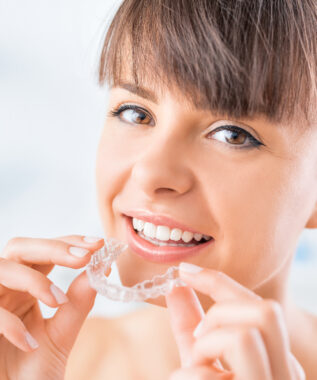 For years you have taken strides to stay on top of your oral health and keep your teeth strong. For instance, your preventive routine is probably something that has become second nature, especially since it is the same routine you have followed day in and day-out. Indeed, brushing and flossing certainly lay the foundation for adequate oral health, but it is important to recognize that there is an even greater number of threats than there are defenses, placing your smile at risk of damage. In today’s blog, your Leawood, KS dentist discusses the damaging effects of chronic teeth grinding and what your treatment options may look like moving forward.
For years you have taken strides to stay on top of your oral health and keep your teeth strong. For instance, your preventive routine is probably something that has become second nature, especially since it is the same routine you have followed day in and day-out. Indeed, brushing and flossing certainly lay the foundation for adequate oral health, but it is important to recognize that there is an even greater number of threats than there are defenses, placing your smile at risk of damage. In today’s blog, your Leawood, KS dentist discusses the damaging effects of chronic teeth grinding and what your treatment options may look like moving forward.
What Causes Bruxism?
From a young age, your family likely instilled in you the importance of caring for your smile. At the time, you may have thought it was nothing more than an effort for adults to make you do things that you did not want to, but in all actuality, it helped you learn important practices for maintaining a healthy smile.
The problem arises, however, in that dental prevention alone is not enough to completely protect your smile. You see, oral bacteria that are present in the grin may be the primary source of damage for most, but that does not mean it is the only thing to worry about. In fact, nontraditional oral health concerns such as a physical accident or injury, or chronic teeth grinding, can lead to significant complications without treatment.
Taking a look specifically at chronic teeth grinding, this phenomenon occurs when a person tightly clenches his or her teeth together and moves the lower jaw from side to side, creating tension and friction. To learn more about this process and how our team can help, give us a call today.
Immediate Damage to Your Teeth
Bruxism, which is the formal name given to chronic teeth grinding, is very problematic if left untreated. The problem is, however, many people might not even notice that they are being affected by it, initially, as it often occurs when a person is asleep.
When a person experiences bruxism, his or her teeth are rubbing together in such a manner that it causes the surfaces of their teeth to wear down. What’s more? This leads to an increased chance he or she experiences breakage, cracking, and dental infection. Contact our team to learn more.
How It Continues to Get Worse
As a person waits to seek treatment, he or she runs the risk of developing a dangerous jaw dysfunction known as TMJ disorder. Fortunately, your teeth can be protected with the help of a custom oral appliance or guided splint therapy.
Schedule Your Next Appointment
Contact Dreem Dentistry in Leawood, KS by calling 913-681-5500 to schedule your next appointment with our office and learn more about the different ways our team can help address your chronic teeth grinding concerns.





